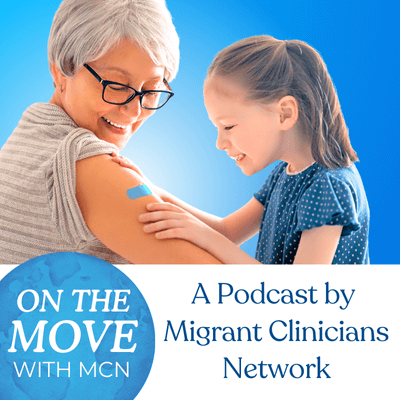Partner Spotlight: La Mujer Obrera fights COVID-19 in El Paso

[Editor’s Note: Since July 2021 Alianza Nacional de Campesinas (Alianza), Migrant Clinicians Network (MCN), Rural Coalition (RC) and 20 organizational partners and members have mobilized 221 community health outreach workers across 20 states and Puerto Rico to encourage vaccination within Black, Indigenous and people of color (BIPOC) rural communities. Funded by an $8.1 million grant from HRSA, the effort aims to raise vaccination rates among immigrant and migrant farmworkers, and rural communities of color through reinforcing COVID-19 information, addressing vaccine hesitancy and accessibility, and assisting in countering misinformation and disinformation.]
La Mujer Obrera is an El Paso, Texas based community organization that has been providing COVID-19 resources to the Chamizal neighborhood of El Paso, an almost entirely Latinx community that has a large population of Spanish-speaking, working-class, residents living below the poverty line. La Mujer Obrera staff presented at a recent Learning Collaborative hosted by Migrant Clinicians Network. These Learning Collaboratives have created an opportunity for organizations like La Mujer Obrera to share best practices and experiences from their work during the pandemic so partners around the country can learn from one another. Ms. Sressa Fonseca, part of La Mujer Obrera’s “Juntos Y Vacunados” campaign formed as part of HRSA’s national vaccination project, shared her organization’s strategies, both new and established, that allow for La Mujer Obrera to help get community members vaccinated.
La Mujer Obrera runs several programs that pre-date the pandemic, including food distribution initiatives and employment training projects. The organization also offers childcare and learning center services. Other key aspects of their work have been advocacy for low-income women in the community and the fight against environmental racism. Beyond providing needed services, for the last 30 years, La Mujer Obrera has worked to protect the cultural traditions of local migrants and immigrants through their involvement in cultural events that preserve traditional cooking, clothing, and other important aspects of Latinx culture for community members. Now, they are able to use the goodwill and trust they have built to help their community make it through the COVID-19 pandemic.
As part of this HRSA initiative, La Mujer Obrera is able to address the needs of the Chamizal community effectively, running weekly vaccination clinics at a local shopping center and facilitating at-home vaccinations for individuals who are unable to attend vaccination clinics. Organization staff also run vaccination clinics at a local community center on a biweekly schedule which has been successful in vaccinating people locally. La Mujer Obrera also offers testing services at several of their clinics.

Another critical strategy has been to work with local employers so that Juntos Y Vacunados can come into workplaces with COVID-19 vaccines. Through this practice, health care workers and focused vaccine efforts are able to go to where the need is, vaccinating as many employees at a worksite as they can. Fonseca shared an example of this successful strategy, saying “One company we went on site... vaccinated about 15 to 20 people there. It was in and out.” Recently, businesses have been pushed by mandates and other pressures to protect their workforce, making it easier for local health efforts like Juntos Y Vacunados to connect with employers to vaccinate their workers. “Time is money on the business front” Fonseca explained, “We’re finding that this is going to be one of our strongest strategies.”
La Mujer Obrera also has staff members from within the community to help with a door-to-door community canvasing project. In the project, a diverse age range of community staff members have been selected to encourage vaccination sign-ups and answer questions community members may have. With this diverse group, staff are able to build trust with anyone who answers the door, allowing for the organization to make the most of their time canvassing. La Mujer Obrera also hands out trifolds, that include information about how to get vaccinated and answers to common questions, to help people get up-to-date information on COVID-19. They have also been utilizing a hotline for the same purpose which has been a successful strategy.
Another critical strategy has been La Mujer Obrera’s use of Google Forms. The organization uses the online survey software to keep detailed records on their vaccination efforts, including collecting information about those they have vaccinated, and documenting the number of vaccines distributed at each clinic. Some of this collected data includes the ZIP codes of vaccinated community members, and the language used in outreach efforts, which helps the organization better understand the demographics of those they vaccinate. The data also helps them know which communities they are protecting.

Fonseca shared La Mujer Obrera’s successes in their vaccination efforts to the members of the Learning Collaborative in an effort to share best and promising practices for COVID-19 vaccination. Communities like the Chamizal neighborhood around the country are struggling to increase vaccination rates, but organizations like La Mujer Obrera can help change this by teaching us incredible tools to use in Spanish-speaking communities. La Mujer Obrera has used resources, materials, and graphics created by MCN, in partnership with NRC-RIM, as part of their efforts to increase vaccination rates, show the reality of vaccines, and debunk many common myths within their community.
Each week MCN facilitates a bilingual Learning Collaborative that offers partners access to clinical staff, other experts, an extensive library of fully editable COVID-19 resources, evidence-based COVID-19 updates, and extensive communications and marketing technical assistance to support partner’s use and adaptation of resources to fit their community’s needs. Each organization shares learning collaborative content and activities with their frontline community health workers, who tirelessly promote COVID-19 vaccination in the counties, towns, and neighborhoods where they live. This blog series highlights best and promising practices used by grant partners across the country, which are shared at the learning collaboratives, creating a diverse learning environment.
This is supported by the Health Services and Resources Administration (HRSA) of the U.S. Department of Health and Human Services (HHS) as part of an award totaling $8,105,547 with 0% percentage financed with non-governmental sources. The content are those of the author(s) and do not necessarily represent the official views of, nor an endorsement, by HRSA, or the U.S. Government. For more information, please visit HRSA.gov.
Resources:
- COVID-19 Vaccine Awareness Campaign Resources
- The COVID-19 Community Health Worker Vaccine Learning Collaborative: Webinars and Resources
Got some good news to share? Contact us on our social media pages above.
Return to the main blog page or sign up for blog updates here.
- Log in to post comments





